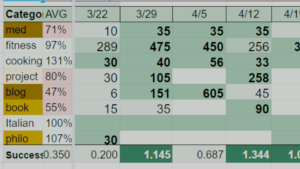Last year I wrote about setting personal goals. One bit of feedback I got went something like, “Goal setting is a bad mindset, you should use systems instead.” I’ve heard that idea before, with a few different justifications. I do have some thoughts, and experience, on using systems to build skills or manage productivity, and I realized I should write on that too in order to make the goal-setting content more complete.
I also realized that the difference between systems and goals kind of stretches deeper, into philosophy a bit, and it would be cool to bring that to light.

The short version of my answer is that a well-adjusted life needs both systems and goals. Neither can fully replace the other (if they could, I would’ve done that myself, because simplicity is advantageous). I’ll go through the common advantages of systems over goals and then talk about the proper place for each. But first—
What are systems?
By systems, I mean activity-based objectives that are recurring or continuous. They can be time-based, like “Spend 30 minutes per day studying a second language,” or event-based, like “Meditate every day.” Usually when we talk about “goals,” we mean event-based objectives that only happen once, like “Pass the fluency exam in second language.”
Unlike goals, systems don’t really measure success, except in the sense that you could ask yourself, “Did I do the recurring objective today/this week/whatever period I specified?”
Advantage: Goals are discouraging
It goes like this: With singular goals, you exist in a perpetual state of failure until you meet the goal, and then it disappears. If your goal is to get 10,000 subscribers, you have to face the reality of coming up short every day, until you get there. And then, you probably won’t even spend much time enjoying your success, because you now have room in your life to set a new goal.
Instead, you could’ve set up a system like, “Produce a new piece of content every week.” Then you get to feel success every week, and you can trust that having good, consistent content will get you more subscribers. Or, instead of setting a goal to lose 20 pounds, you could have a system of continuous dieting and recurring exercise, and run that system until you’re happy with your body. Systems frequently give you a feeling of success, and that psychological reward can be the difference between succeeding and quitting.
I do see the point here, and I’ve experienced firsthand how you can feel good and right about everything when you’re sticking to your systems. And it’s really a joy, when you’ve been “heads-down” blindly following a system for a while, to randomly look up and see how far you’ve come.
Advantage: Systems can be updated
Systems can be updated more often than goals, and this can be a good thing. Their recurring nature means you often reevaluate your systems—do they still reflect your desires? Systems can change as you change, whereas goals are either met or failed. If your desire changes halfway through a goal, you’ll need to either “power through” (spending time and effort on things you don’t really want) or give up (which can hurt your future willpower, because willpower compounds). Systems won’t force you into such dilemmas.
The case for systems over goals
I’ve found that systems are better for changing your own state of being. I don’t mean for that to sound mystical or anything. “More skilled at X” is a state of being, and systems are great for building skills. For example, in learning a second language you absolutely want to set up a system of study and practice. You could set a goal like “pass the fluency exam,” but without a system, you’d just be incentivizing yourself to “teach to the test,” and that’s probably not what you really wanted.
Your sense of identity is also a state of being. If you want to identify as an artist, you just have to make art! Set up a system for engaging in artistic expression regularly, follow it, and you are an artist. A goal like “make a piece of art, in X person’s style, at their skill level” could leave you feeling inadequate most of time and therefore uncomfortable calling yourself an artist. And that’s no fun.
A lot of times, the desires that make poor goals make excellent candidates for systems. When someone in a coaching type of role asks you what your goals are, and you say, “Get better at X,” and they say, “Ah but that’s not measurable / time-limited,” they may nudge you to make it measurable and time-limited, and that may not be ideal! Your original wording of “get better at X” might be an indicator that you’d be happier following a system for X. It depends on the nature of the desire. More on that later.
The case for goals over systems
Systems are encouraging, forgiving, and flexible, but sometimes you really do just want a particular thing in the physical world, even more than you want the subjective experience of success! And oftentimes, systems are less certain to get you that particular thing. Using the weight loss example, say you really just want to lose 20 pounds—you know you’ll look good at that weight, you know you’ll be healthy at that weight, etc. You set up a system of diet and exercise, and you follow it. You “eat right and move right” every day—but after a year you weigh exactly the same. How is that possible? Well, there’s a million ways it’s possible. “Eat right move right” is a subjective assessment, and “-20 lbs.” is a state of the physical world. The two can easily become detached.
By following that system and anticipating a concrete end state, you’re gambling your success on the hope that your (probably untested) intuitions for “eat right” and “move right” just happen to be correct enough to change the physical world in the way you want. Why gamble on that, when you could be measuring your actual progress and updating your strategies all along? Because that’s what a set goal should look like: measure progress regularly, and if you’re not seeing progress, reevaluate your methods and try something new. You can try more and more drastic things until you start seeing progress. The goal guarantees progress, whereas the system implies progress.
The same goes for “get X subscribers” vs. “produce content regularly.” You can be producing content regularly and just not have it seen—maybe it’s not the content people want; maybe you’re not promoting it enough;, maybe you’re on the wrong platform. If X subscribers is what you really want, then that needs to be the goal. Your system of “produce content regularly” can still exist, but only insofar as it drives progress toward the goal.
Deeper differences
Systems vs. goals connects to a deeper personal question—it’s not so much “What do you want in life?” but rather “How do you want things in life?” When you think about how your life could be more preferable in the future, do you think about particular changes that could happen in the physical world (goals), or do you think about different states of being that you could exhibit (systems)?
I think if you list out enough of the things you want, you’ll get answers in both categories…
Goal-oriented desires:
- Do you want to live in a particular place?
- Do you want to have a particular job? Or work at a particular company?
- Do you want a particular amount of income or net worth?
- Do you want to have a certain size impact in the work that you do?
- Do you want to win a particular award or title for the work you do?
System-oriented desires:
- Do you want to play a musical instrument? Be better at writing? Learn a new language?
- Do you want to be more knowledgeable about a topic?
- Do you want to be more social? Be a better friend or partner?
- Do you want to experience more peace of mind? Be more resilient to stress?
- Do you want to feel better in the morning, or sleep better at night?
…But maybe not! Sometimes you meet people who only seem to want concrete things – “I want this promotion, then financial independence, then to get married, then to settle onto a small farm, then to have two kids.” And sometimes you meet people who only seem to want an ideal state of being – “The circumstances don’t matter as long as I have my health, peace of mind, and a community that loves me.”
And in any case, people will differ on whether their highest drive is a goal (perhaps with lesser systems to support it) or a system (perhaps with lesser goals to support it).
And the people who lean heavily to one side will tend to judge the other. The goal people will see the system people as ineffectual; the system people will see the goal people as robotic. It becomes a question of philosophy: Is your life purpose to do certain things or to be a certain person?
I’m happy for both sides as long as they’re getting what they really want. Below I’ll share my own experience with the tension between systems and goals, for what it’s worth.
Aside: My own system/goal integration
In roughly my first five years out of college, I was heavily into systems. I used a spreadsheet tool to track my time spent in different categories like reading books, working out, and doing creative projects. My main desire was to improve my “effectiveness”—my general ability to accomplish a given task.

I landed on that because college didn’t really give me a strong singular idea of what to do with my life, so I thought I’d better just put work into myself and make myself ready for when some particular path appeared to me.
Effectiveness is a state of being, and I think my system was well suited to change me in that direction.
That eventually grew into an ideal-version-of-myself type of project. Inspired by a lot of self-help content I consumed during that time, it included not just practices to make myself smarter and stronger, but mindsets to make myself better socially, as well as practices that were pleasurable for their own sake. I wrote down all of those things and tried to organize them causally, marking which ones contributed to which. It got pretty complicated…

But I ended up with five core virtues at the root. And so that became a system too—regularly reminding myself of those virtues and the good patterns of behavior that naturally follow.
I continued using the same spreadsheet tool for managing my time, and altogether it was an elaborate, beautiful set of systems. I did change and grow in many of the ways I wanted to. During that time I’d think to myself, “If I’m being the best version of myself, I don’t have to worry about what I actually do, because that is downstream of who I am as a person.” And that’s true to an extent, but it wasn’t the whole picture.
In 2019 I started to feel differently about it. I’d made some new friends, read some new blogs, and started to notice that I was spinning my wheels in some obvious ways. I was doing impractical things and ignoring the results (or lack thereof), because I thought as long as the system was being followed everything was good.
-
- Plus, I’d spend too long on individual projects, wasting time that I could’ve spent finishing more projects. If the system just says “work on art for X hours per week,” that doesn’t incentivize you to manage your time in a way that actually produces lots of good art.
- It was a similar story with the reading I was doing—collecting random knowledge about philosophy and history. I realized I didn’t just want to be a guy with some eclectic knowledge, I wanted to share it, and that required turning it into something practical yet grounded that others could more easily adopt and use. And that takes some strategizing beyond just “read books you’re interested in for X hours per week.”
- All the work on social skills was good, but I wasn’t really growing the social network I wanted. That would take more practical steps like figuring out whom exactly I wanted to know, and where/how to connect with them.
It was a similar story for a bunch of other things. I was focused on being a certain way, and I didn’t notice that there were also some very concrete things that I wanted to get for myself! And my systems-based approach was not the right path to getting them.
If you just want to get the thing, you do that by seeking good advice, applying all your cause-and-effect knowledge of the world, creating a pragmatic A-to-B plan with checkpoints, and reevaluating your methods as the checkpoints are or aren’t reached. Systems are often too “heads-down” for all that. Systems say “trust the process,” and that works, but only for what the process was meant to do for you.
My place for systems
If you’re improving yourself without a particular goal—just doing fully general self-improvement—I will say that does work for a while. You can get physically fit, hone a bunch of interesting skills, build a robust worldview, and get to know yourself better. But in my experience you eventually hit a wall where the things you want are too specific to reliably get through the system.
At that point, I pivoted to setting a bunch of long-term concrete goals, the process of which I’ve written about here. That’s been working for me, and I think much of my systems-based focus was necessary. It did make me into an effective person, and that’s what you need to be once you start putting challenging goals in front of yourself. It provided a ton of practical self-knowledge, like knowing which things I tend to spend time on, how I get into and out of patterns of creative work, how much nonfiction I can practically read in a week, etc. Because, that’s a real risk with goal-setting: we bite off more than we can chew and find ourselves stressed and exhausted, hitting all kinds of roadblocks to our productivity that we didn’t anticipate.
So now I do both. I still use that time-tracking spreadsheet (and I’ll share it with you sometime soon), but I don’t take it quite as seriously now. I view the systems as a way to maintain a bunch of different things about myself—like physical health, art skills, continually ingesting new ideas—so I can be constantly ready to pursue my goals and do so without letting everything else fall apart.
But maybe you are different. Maybe for you, an ideal state-of-being is the most important thing, and whatever concrete goals you set for yourself will actually just be to help set up or support your systems. And maybe you don’t want to set goals at all, or systems at all, because that’s just not how your desires work. Maybe it’ll change over time in unexpected ways, like mine did.


So much to think about. At this point in my life I have learned that every day is a challenge we can meet it with joy and grow from it or focus entirely on goals. Sure I make lists because I intend to accomplish (chew off more than I can handle) but that list can be one that may exist a while, checking off one or two items and then growing each day. This can tend to give me more stress than I need-so I have come to the conclusion that I will do what the Spirit leads me to and understand that those around me are really what’s important in life. Where I am at the moment becomes part of me and defines how I will spend my very precious time which is the gift I treasure.
MAN